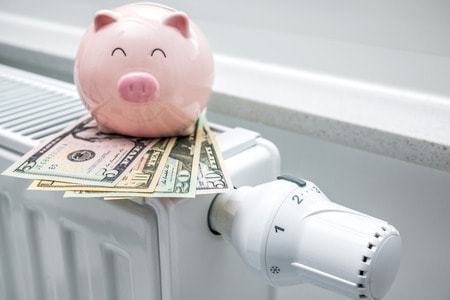The holiday season is over, but that doesn’t mean you can’t save money during the cold winter months.
 When it’s cold outside, that’s prime time to save money during the cold winter months. While the winter season is sometimes when expenses are the greatest, it also means there are more opportunities to save money. The following are a few ways how to do just that.
When it’s cold outside, that’s prime time to save money during the cold winter months. While the winter season is sometimes when expenses are the greatest, it also means there are more opportunities to save money. The following are a few ways how to do just that.
Tip #1: Adjust Your Thermostat
If you can stand it, lower the thermostat temperature setting as much as you can. According to the United States Department of Energy, lowering your thermostat seven to 10 degrees for eight hours each day can result in roughly 10 percent in energy savings.
A seven to 10-degree drop in indoor temperature is pretty extreme, so it’s understandable if that’s a bit too much for most people. But a one to two-degree change during the day and a three to four-degree change at night is realistic. Nighttime is a great time to lower the thermostat as much as possible because you will be asleep and bundled under the covers. Also, it helps to be a little bit cooler at night. This is because the human body needs to lower its body temperature slightly when it falls to sleep.
Tip #2: Bundle Up Inside
If you lower your thermostat’s setting, you can still stay warm by bundling up. Wearing socks, slippers and a sweatshirt can keep you toasty warm even though the thermostat’s setting is a few degrees cooler. For added warmth, you can have several blankets or quilts handy in certain parts of the home, such as the living room couch.
Tip #3: Get your Central Heater Inspected
Your HVAC system is an expensive and complex piece of machinery. To ensure it operates as efficiently as possible, it should get a routine maintenance inspection. Most established HVAC professionals will offer to do this maintenance inspection or have special contracts that will schedule this inspection twice each year.
During the inspection, the HVAC technician will change the HVAC air filter, calibrate the thermostat and examine the moving parts of the system to make sure everything is on the up and up. If the inspection finds a potential problem, the technician will bring it to your attention. These routine inspections are great for energy savings because they identify any potential areas of energy inefficiency.
Tip #4: Humidify Your Indoor Air
One way to feel a bit warmer is to have a little bit of extra moisture in the air. So running a humidifier inside your home can help feel slightly warmer even when it’s really not. But adding moisture to the air to feel warmer is just one of the benefits. Another benefit is avoiding really dry air which can cause winter itch and damage some wood products, like hardwood flooring.
If you do decide to run a humidifier, make sure you don’t put too much moisture into the air. Having a hygrometer to measure the indoor humidity is important. These are available for less than $10 and help keep the indoor relative humidity at ideal levels, which is around 40 percent to 55 percent.
Tip #5: Look for Air Leaks Around the Home
Even with the most efficient HVAC system and turning down the heat, much of the energy (and therefore cost) savings can literally go right out the door or window if you have air leaks. Take some time to search for any air leaks around the windows and doors for your home. You can do this by putting your hand up to the edges of the windows and doors and see if you feel a draft. You can find the obvious ones with your hand. The smaller ones require something more sensitive, such as a candle. Hold a candle up to a window or door seam to see if the flame flickers or moves in one direction. If so, there is an air leak. You can seal these up with caulk or weather stripping.
Tip #6: Fight Vampire Electricity to Save Money During the Cold Winter Months
Most modern electronics, such as big screen televisions, computers, DVRs and video game consoles, will draw a small amount of electricity even though they’re turned off and not in use. This is what many refer to as vampire electricity. In a large home with several of these devices, each device’s vampire electricity draw can add up to noticeably higher energy bills. Stop vampire electricity by either unplugging your device or plugging them into a special power strip that can stop the never-ending continuously pull of electricity.
If you’re working on learning how to save money during the cold winter months, an auto pawn could help. Call your nearest Title Tree location for help now.
